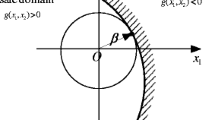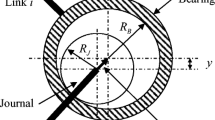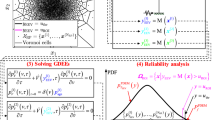Abstract
In reliability analysis, the probability density function (PDF) of the directional importance sampling method is based on a multi-dimensional vector (i.e., multivariate), thus it is inefficient to obtain the important directional vectors (IDVs) by sampling each dimensional component randomly. In this paper, an efficient solution approach of vector-angle geometric mapping is proposed. Firstly, the angles between IDVs and the design point position vector are set as the important direction angles (IDAs) in the standard Gaussian space. By exploring the geometric relationship between IDVs and IDAs, the PDF of multi-dimensional IDV can be converted into the PDF of one-dimensional IDA, following which, the cumulative distribution function of IDA is derived by integration. Further, the cumulative distribution is sampled uniformly using the Latin hypercube technique, and then the uniform IDAs are generated by inversion. Finally, the IDVs are shown by geometric mapping of the IDAs. The research results show that the PDF of IDA is jointly determined by the two parameters, dimensionality and reliability index. Therefore, the distribution characteristics of IDA can be explored and diagrammatically represented, and the obtained IDVs can be used repeatedly for other reliability analysis with the same mentioned parameters to improve the computational efficiency. The applicability, accuracy, and robustness of the proposed approach are proved on illustrative examples, battery pack and truss structure engineering applications.





















Similar content being viewed by others
References
Au SK (2016) On MCMC algorithm for subset simulation. Probab Eng Mech 43:117–120
Au SK, Beck JL (2001) Estimation of small failure probabilities in high dimensions by subset simulation. Probab Eng Mech 16(4):263–277
Balesdent M, Morio J, Marzat J (2013) Kriging-based adaptive importance sampling algorithms for rare event estimation. Struct Saf 44:1–10
Bjerager P (1988) Probability integration by directional simulation. J Eng Mech 114(8):1285–1302
Blumenson L (1960) A derivation of n-dimensional spherical coordinates. Am Math Mon 67(1):63–66
Bucher C (2009) Computational analysis of randomness in structural mechanics: structures and infrastructures book series, vol 3. CRC Press, Boca Raton
Cavazzuti M (2012) Optimization methods: from theory to design scientific and technological aspects in mechanics. Springer Science & Business Media, Berlin
Cheng J, Jin H (2021) An adaptive extreme learning machine based on an active learning method for structural reliability analysis. J Braz Soc Mech Sci Eng 43(12):1–19
Deák I (1980) Three digit accurate multiple normal probabilities. Numer Math 35(4):369–380
Der Kiureghian A, Lin HZ, Hwang SJ (1987) Second-order reliability approximations. J Eng Mech 113(8):1208–1225
Ditlevsen O, Bjerager P (1989) Plastic reliability analysis by directional simulation. J Eng Mech 115(6):1347–1362
Ditlevsen O, Olesen R, Mohr G (1986) Solution of a class of load combination problems by directional simulation. Struct Saf 4(2):95–109
Ditlevsen O, Bjerager P, Olesen R, Hasofer A (1988) Directional simulation in Gaussian processes. Probab Eng Mech 3(4):207–217
Ditlevsen O, Melchers RE, Gluver H (1990) General multi-dimensional probability integration by directional simulation. Comput Struct 36(2):355–368
Gaspar B, Naess A, Leira BJ, Soares CG (2014) System reliability analysis by Monte Carlo based method and finite element structural models. J Offshore Mech Arct Eng 136(3):031603
Gipple J (2014) The volume of n-balls. Rose-Hulman Undergrad Math J 15(1):14
Grooteman F (2008) Adaptive radial-based importance sampling method for structural reliability. Struct Saf 30(6):533–542
Grooteman F (2011) An adaptive directional importance sampling method for structural reliability. Probab Eng Mech 26(2):134–141
Guo Q, Liu Y, Chen B, Zhao Y (2020) An active learning Kriging model combined with directional importance sampling method for efficient reliability analysis. Probab Eng Mech 60:103054
Johnson NL, Kotz S, Balakrishnan N (1994) Chapter—chi-squared distributions including chi and Rayleigh. Continuous univariate distributions, vol 1, 2nd edn. Wiley, New York, pp 415–493
Katafygiotis LS, Zuev KM (2008) Geometric insight into the challenges of solving high-dimensional reliability problems. Probab Eng Mech 23(2–3):208–218
Li T, Pan Q, Dias D (2021) Active learning relevant vector machine for reliability analysis. Appl Math Model 89:381–399
Liu WS, Cheung SH, Cao WJ (2019) An efficient surrogate-aided importance sampling framework for reliability analysis. Adv Eng Softw 135:102687
Melchers R (1990) Radial importance sampling for structural reliability. J Eng Mech 116(1):189–203
Melchers RE, Beck AT (2018) Structural reliability analysis and prediction. Wiley, Hoboken
Meng Z, Zhang D, Liu Z, Li G (2018) An adaptive directional boundary sampling method for efficient reliability-based design optimization. J Mech Des 140(12):121406
Motta RdS, Afonso SM (2016) An efficient procedure for structural reliability-based robust design optimization. Struct Multidisc Optim 54(3):511–530
Nie J, Ellingwood BR (2000) Directional methods for structural reliability analysis. Struct Saf 22(3):233–249
Nie J, Ellingwood BR (2004) A new directional simulation method for system reliability. Part II: application of neural networks. Probab Eng Mech 19(4):437–447
Pradlwarter H, Schueller G, Koutsourelakis PS, Charmpis DC (2007) Application of line sampling simulation method to reliability benchmark problems. Struct Saf 29(3):208–221
Qi G, ZHANG J, Chunlin T, Cancan W, (2012) Neural networks combined with importance sampling techniques for reliability evaluation of explosive initiating device. Chin J Aeronaut 25(2):208–215
Rubinstein RY, Kroese DP (2016) Simulation and the Monte Carlo method, vol 10. Wiley, Hoboken
Shayanfar MA, Barkhordari MA, Barkhori M, Barkhori M (2018) An adaptive directional importance sampling method for structural reliability analysis. Struct Saf 70:14–20
Song S, Lu Z, Song Z (2011) Reliability sensitivity analysis involving correlated random variables by directional sampling. In: 2011 international conference on quality, reliability, risk, maintenance, and safety engineering. IEEE, pp 845–850
Song J, Wei P, Valdebenito M, Beer M (2021) Active learning line sampling for rare event analysis. Mech Syst Signal Process 147:107113
Teixeira R, Nogal M, O’Connor A (2021) Adaptive approaches in metamodel-based reliability analysis: a review. Struct Saf 89:102019
Xiao NC, Zuo MJ, Zhou C (2018) A new adaptive sequential sampling method to construct surrogate models for efficient reliability analysis. Reliab Eng Syst Saf 169:330–338
Xiao M, Zhang J, Gao L, Lee S, Eshghi AT (2019) An efficient Kriging-based subset simulation method for hybrid reliability analysis under random and interval variables with small failure probability. Struct Multidisc Optim 59(6):2077–2092
Yin M, Wang J, Sun Z (2019) An innovative DoE strategy of the Kriging model for structural reliability analysis. Struct Multidisc Optim 60(6):2493–2509
Zhang X, Lu Z, Cheng K, Wang Y (2020) A novel reliability sensitivity analysis method based on directional sampling and Monte Carlo simulation. Proc Inst Mech Eng O 234(4):622–635
Zhang X, Lu Z, Cheng K (2021) AK-DS: an adaptive Kriging-based directional sampling method for reliability analysis. Mech Syst Signal Process 156:107610
Zhao YG, Ono T (1999) A general procedure for first/second-order reliability method (FORM/SORM). Struct Saf 21(2):95–112
Zhong C, Wang M, Dang C, Ke W, Guo S (2020) First-order reliability method based on Harris Hawks optimization for high-dimensional reliability analysis. Struct Multidisc Optim 62:1951–1968
Acknowledgements
This work was supported by the National Natural Science Foundation of China (Nos. 51775193 and 52175267), Science and Technology Planning Project of Guangzhou City of China (No. 202007020007) and Science and Technology Planning Project of Guangdong Province of China (No. 2015B010137002).
Author information
Authors and Affiliations
Corresponding author
Ethics declarations
Conflict of interest
The authors declare that they have no conflict of interest.
Replication of results
The “Replication of results” is now modified. This revision provides data results and corresponding visualization codes for all computable figures in the paper. The rest of the figures are schematics and do not need to be replicated. Because of the large amount of data and codes used in figures, the author uploaded the codes to Github. Readers can visit https://github.com/Wang920133787/Matlab-figures.git to download. The steps to run the code are very simple, please download the folder and put it in MATLAB environment, open the corresponding “m” file and run directly, Some Figures need arrow.p file to call the arrow function, so the “arrow.p” file should be in the same folder. The engineering example involves a complex process (finite element modeling and time-consuming simulation), some parameters of the battery pack and the innovative core algorithm are still under a confidentiality agreement. Therefore, we have removed the tedious process here and all illustrative examples provide only the results of the simulation. But the pseudo-code of the core algorithm is provided in Sect. 5 for readers’ reference. We do not know whether this revision can meet the requirements. If there are still any deficiencies, please give us feedback. We will try our best to meet the requirements. Thank you.
Additional information
Responsible Editor: Chao Hu
Publisher's Note
Springer Nature remains neutral with regard to jurisdictional claims in published maps and institutional affiliations.
Rights and permissions
About this article
Cite this article
Wang, J., Chen, J., Zhou, Y. et al. Vector-angle geometric mapping-based directional importance sampling method for reliability analysis. Struct Multidisc Optim 65, 154 (2022). https://doi.org/10.1007/s00158-022-03217-w
Received:
Revised:
Accepted:
Published:
DOI: https://doi.org/10.1007/s00158-022-03217-w




